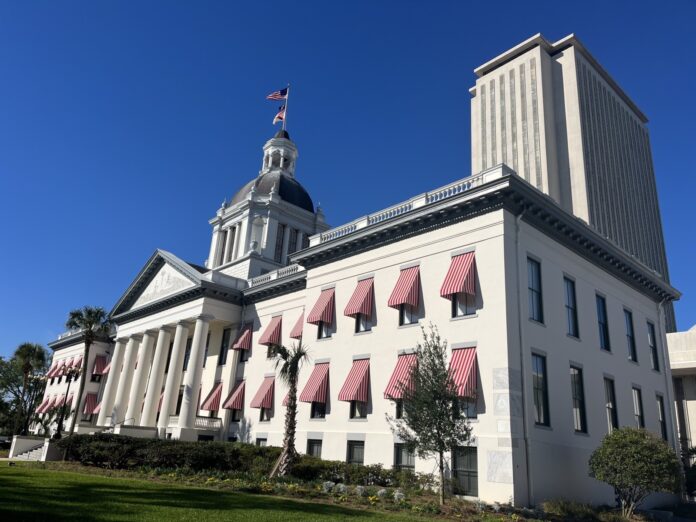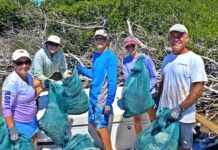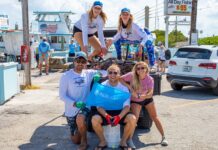Time is of the essence for painters, pavers, landscapers and other specialty contractors in the Florida Keys and throughout the state affected by a 2021 bill that preempted local occupational licensing.
A 60-day legislative session that began in Tallahassee on March 7 is the last shot to change House Bill 735 that was approved by the legislature and signed by Gov. Ron DeSantis following a 2021 session. Legislation sought to eliminate redundant licenses for contractors who work in various municipalities, all while protecting a homeowner against subpar work from inexperienced contractors.
However, the bill ultimately prevented local municipalities, like Monroe County, from issuing specialty licenses to those who work outside the scope of general contractors.
County officials stopped issuing new specialty licenses in July 2021, but existing licenses were honored for two years, the maximum allowed by law, before they expire this year.
Recently, state Rep. Jim Mooney, Republican who represents the Keys and a portion of south Miami-Dade, filed legislation after learning that a House member who was going to file the bill decided against leading such a change. Mooney filed the four-page House Bill 1625 on March 8.
The bill’s text states that a license from a local government or the state isn’t needed for a job that’s outside the scope of contractor work. That would include painting, flooring, cabinetry, interior remodeling without a structural component, driveway installation, handyman services, decorative stone, plastering, pressure washing, caulking, awning and ornamental iron installation, to name several. All work performed within the job scopes without a license issued by a local government or the state must comply with all applicable local ordinances.
But specialty contractors could need a license that’s issued by a local government for a number of specialty jobs if the local government imposed a licensing requirement before Jan. 1, 2021. Those jobs would include aluminum or screen enclosure, carpentry with a structural component, pool barriers, marine work, demolition, excavation and clearing, concrete forming, plaster and lath, rental apartment maintenance, roof painting, paving, hurricane windows, garage door installation and pile driving, to name several.
Changes to House Bill 735 sit high on the legislative agenda for Monroe County this year. Lisa Tennyson, legislative affairs director, said House Bill 1625 fixes the issues the county saw with House Bill 735 by reestablishing local licensing for important trade work. Now, she’s urging all contractors to reach out to representatives in Tallahassee by writing letters of support.
“I told the local contractors board that we will have to get personally engaged,” she said.
Legislation was referred to the House Commerce Committee, Regulatory Reform & Economic Development Subcommittee, State Administration & Technology Appropriations Subcommittee and Regulatory Reform & Economic Development Subcommittee.
A similar bill in the Senate was filed by Republican state Sen. Ed Hooper. Senate Bill 1570 was referred to the Regulated Industries and Rules committees. Tennyson said Hooper’s bill has the support of Senate President Kathleen Passidomo.
AFFORDABLE HOUSING BILL MOVES THROUGH SENATE
On March 8, Florida senators voted 40-0 for an affordable housing bill that proposes hundreds of millions for housing programs. Senate Bill 102, sponsored by Republican state Sen. Alexis Calatayud, also included language pertaining to the Florida Keys’ 1,300 new building permit allocations for deed restricted affordable housing. In 2018, then-Gov. Rick Scott approved the Keys Workforce Housing Initiative that provided those allocations, which included a 48-hour evacuation in advance of hurricane landfall.
Those units went through a legal battle with the Third District Court of Appeals (Third DCA) ruling that the “early evacuation” requirement violated Florida Statute, which requires comprehensive plans of cities within the Florida Keys Area of Critical State Concern (ACSC), established in 1974, to “maintain a hurricane evacuation clearance time for permanent residents of no more than 24 hours.”
Requests for the Third DCA to re-hear the case weren’t fulfilled. On Jan. 13, the state Supreme Court rejected an escalation of the appeal, seemingly leaving a legislative fix as the only viable option.
Marathon, Islamorada and unincorporated Monroe County were affected by the Aug. 3, 2022 reversal that put each municipality’s 300 units at risk. A total of 100 units for Key Colony Beach and Layton were also in jeopardy.
Legislation is especially vital for Marathon since it already allocated its units. As its own Area of Critical State Concern outlined in 1984, Key West’s units were protected.
State Sen. Ana Maria Rodriguez said she already filed a standalone bill that wasn’t part of the bigger affordable housing legislation that would have codified the 1,300 workforce housing units. Overall, Rodriguez said she’s delighted that Calatayud amended her bill to include language for the Keys workforce housing that unanimously passed the Senate floor.
“These desperately needed units will bring much needed affordable inventory for our workforce in the Florida Keys,” Rodriguez told the Keys Weekly.
Senate Bill 102 dedicates $100 million to the Hometown Heroes Program, which provides down-payment assistance to the community workforce. Teachers, health care workers, law enforcement and service members are among the workers who can receive assistance. The bill also prohibits government-mandated rent controls, outlines procedures for expediting permits and promotes multifamily housing opportunities in commercial, industrial and mixed-use areas, provided that 40% of those residential units are for families earning up to 120% of the area median income for at least 30 years.
Legislation was sent to the House for consideration.
























